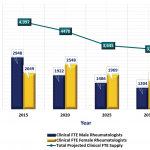In 2005, an ACR Workforce Study estimated the adult rheumatology workforce to be 4,946 providers and projected growth of only 1.2% by 2025, resulting in a projected deficit of 2,576 rheumatologists considering the estimated need. According to the 2015 Workforce Study, between 2005 and 2015, the percentage of internal medicine residents entering rheumatology has remained stable at ~4%. During this period, the number of internal medicine residents has increased, resulting in a small increase in entrants into rheumatology. However, that small increase will fail to close the gap between the number of rheumatologists available and needed.
Graduate medical education (GME), through fellowship training, plays a critical role in preparing new rheumatologists for our workforce and is an essential component when addressing the gap of excess demand for adult rheumatology care. The number of adult rheumatology fellowship training programs increased from 108 (in 2005–2006) to 113 (in 2015–2016), with an associated increase in the number of available positions (396 in 2006–2007 to 470 in 2015–2016). This reflects an increase in the number of programs and available positions within the programs. It should be noted that not all positions are filled each year (e.g., 431 of 468 positions were filled in 2014–2015). At the same time, ~50 applicants to adult rheumatology fellowships fail to match each year.
Conclusion: The current U.S. adult rheumatology workforce is in jeopardy of accelerated decline at a time when demands on the workforce face tremendous growth. The current GME training structure cannot support the increased demand. Potential strategies to address this gap include innovative mechanisms for GME funding to increase fellowship training positions, incentives for pursuing rheumatology training (e.g., loan repayment programs), and novel means for recruitment of care to underserved areas of the U.S.
It is evident that we must train more rheumatologists, and this will demand innovative graduate medical education funding mechanisms.
Excerpted and adapted from:
Bolster MB, Bass AR, Hausmann JS, et al. 2015 American College of Rheumatology workforce study: The role of graduate medical education in adult rheumatology. Arthritis Rheumatol. 2018 Jun;70(6):817–825.



